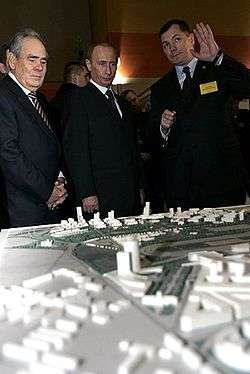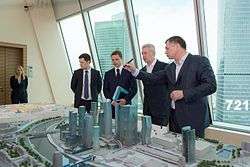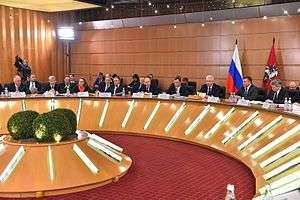Marat Khusnullin
| Marat Khusnullin | |
|---|---|
 | |
| Deputy Mayor of Moscow in Government of Moscow for Urban Development and Construction | |
|
Assumed office Since 2 December 2010 | |
| Personal details | |
| Born |
Marat Shakirzyanovich Khusnullinin Марат Шакирзянович Хуснуллин 9 August 1966 Kazan, TASSR, Russian SFSR, Soviet Union |
| Citizenship | Soviet Union, Russia |
| Alma mater | Kazan State Finance and Economics Institute |
| Profession | Candidate of Sciences in Economics |
| Awards |
|



Marat Shakirzyanovich Khusnullin (Russian: Марат Шакирзянович Хуснуллин; born August 9, 1966) is a Russian statesman, Deputy Mayor of Moscow in the Government of Moscow for Urban Development and Construction.[1][2][3]
Biography
Marat was born in 1966 in Kazan, Russia.
- In 1990 he graduated from Kazan State Finance and Economics Institute with a degree in "Economy"
- In 2000 he Continued his postgraduate education at the Open University (UK) with a degree in Professional Management.
- From 2006 Candidate of Sciences in Economics
- 2001-2010 Minister of Construction, Architecture, Housing and Utilities of the Republic of Tatarstan
- From 2 December 2010 Deputy Mayor of Moscow in Government of Moscow for Urban Development and Construction
Career
in Tatarstan
During his leadership of the Ministry of the republic was brought a large amount of federal investments, primarily under the development program of housing construction in Tatarstan. The program was focused on the development of territories agglomerations of large cities of the republic - Kazan, Naberezhnye Chelny, Nizhnekamsk, Elabuga, Almetyevsk - in a single town-planning decisions, allowing a minimal cost to ensure their utility, a result of the spatial development of the Republic of Tatarstan road transport and social Infrastructure. many cities on the production and financial potential, dynamic development were comparable with the capital of the republic.
Marat Khusnullin in Kazan began the construction of sports facilities that were involved in the 2013 Summer Universiade. By May 2010, in the capital of Tatarstan were commissioned in 26 sports facilities.
2011-2015
100% of the real estate fund is constructed in 5 years. 41 million m² of real estate, 15 million m² of housing. 93% solved the problem of defrauded investors.
55,000 people are involved in the construction of the Moscow Metro.[4] 10% of the total length of the Moscow Metro is built over 5 years. constructed 35 kilometers of lines, 18 new stations (Borisovo, Shipilovskaya, Zyablikovo, Novokosino, Pyatnitskoye Shosse, Alma-Atinskaya, Lermontovsky Prospekt, Zhulebino, Delovoy Tsentr, Park Pobedy, Lesoparkovaya, Bittsevsky Park, Spartak, Troparyovo, Kotelniki, Tekhnopark, Rumyantsevo and Salaryevo), 4 electrodepot. construction of a Third Interchange Contour. construction of Moscow Central Circle (54 km of lines, 31 stations) Moscow Railway will be part of a single Moscow urban public transport system. 31 modern transport interchange hubs will built on Moscow Central Circle. Transport hubs will connect the metro, railway, public and private transport. In their structure will work offices, shopping malls, shops and cafes.
in 5 years built 10% of the existing urban road network. 400 km of roads built in 5 years. 118 bridges, overpass and tunnels. 140 pedestrian crossings, 12 traffic interchanges at the intersection with the Moscow Ring Road, 8 highways.
Moscow has ceased to be a leader in traffic jams among megacities, 16% Moscow improved its on busy roads renovation of industrial zones, the city return 13 thousand hectares of depressed areas.
Expansion in Moscow in 2011 (the so-called "New Moscow"), the biggest in the history of the administrative-territorial division of the city's expansion project in Moscow is about 2.4 times at the expense of the Moscow region. New Moscow by 2015, 40% increase in the population of the new Moscow, a 2-fold increase in the number of jobs. in 4 years introduced 9.48 million m² of real estate in New Moscow. built and put into operation 23 kindergartens, 8 schools, 9 objects of healthcare including 7 clinics. The first subway line, which stretches into new territories, became Sokolnicheskaya Line. The length of the renewable area - 7.6 km. It opened two new stations - Rumyantsevo and Salaryevo.
120 km of embankments of Moskva River will be landscaped, 24 bridges will be built, 40 new public space. in 2017 Moscow will have a unique world-class landscape park, park Zaryadye where previously there was Rossiya Hotel. 12-million a year park attendance.
Since March 2012 he led the staff to address the issues and the construction of MIBC "Moscow-City" (due to the financial crisis of 2008 had suspended work on the construction of the towers of the "Federation Tower" and "Russia Tower" and complex "Evolution Tower": due to the lack of credit resources investors or frozen work or out of the project). the plan was revised delivery of objects: all work will be completed in 2016; due to the bandwidth of access roads, it was decided to abandon the 20 thousand parking spaces in the "Moscow City" - because in the long term this could adversely affect the transport situation and lead to the collapse of the region. Instead, it was decided to reconstruct part of the streets in the area of MIBC, in particular to build new transport interchanges (the construction of seven additional multi-lane road junctions around 2.5 km length was completed in autumn 2012).
In the spring of 2013 adopted a draft plan of industrial zone "ZiL", former ZiL plant. The territory is divided into nine functional parts, which will be built in residential neighborhoods, business center, parks, sports cluster, the production of cars. As a result, on the site of an abandoned industrial zone will "city within a city" with the available transport infrastructure, jobs and social facilities. in the new district will live 40 thousand people and about 50 thousand new jobs. The construction of the first facilities in the territory of the former ZiL plant began in late 2013. VTB Ice Palace was built in Zil area.
Children's amusement park "Dream Island" is being built in 2016 on the territory of Nagatino Poima in Nagatinsky Zaton District. The territory of the new theme park covers 100 hectares and will include the world’s biggest theme amusement park, multifunctional concert hall, multiplex, hotel, yacht club and children’s yacht school. Much of this territory will be developed as a public park, including a pedestrian zone along the bank of the Moscow River. the theme park area comparable to the size of 25 football fields.
2017 FIFA Confederations Cup and 2018 FIFA World Cup, Khusnullin directs the project for reconstruction of Luzhniki stadium and adjacent infrastructure. 6 training pitches including 3 field in the territory of Luzhniki. 11 new soccer fields, Spartak metro station, Luzhniki station. Luzhniki and Otkrytiye Arena will host both tournaments in Moscow. CSKA Moscow Stadium and VTB Arena will be a training field during World Cup 2018.
Head of Complex of urban policy and the construction of the city of Moscow

The complex comprises seven executive authorities of the Moscow government:
- Department of Urban Development. (Department Head Sergei Lyovkin)
- Department of Construction. (Department Head Andrei Bochkaryov)
- Department for the Development of New Territories (Department Head Vladimir Zhidkin)
- Committee for Architecture and Urban Development (Committee Chairman Yuliana Knyazhevskaya)
- Committee for State Oversight in Construction. (Committee Chairman Oleg Antosenko)
- Committee for Pricing Policy in Construction and State Project Inspection (Committee Chairman Valery Leonov)
- Directorate for Investment Project Support and Participatory Construction Oversight. (Committee Chairman Konstantin Timofeyev)
Private life
He is married and has three children.
Honours and awards
- Medal of Merit in the All-Russia Census. (2002)
- Honorary title of Merited Builder of Russia. (2004)
- Honorary title of Merited Builder of the Republic of Tatarstan. (2005)
- Medal "In Commemoration of the 1000th Anniversary of Kazan". (2005)
- Medal "100 Years of Russia’s Trade Unions". (2005)
- Medal of the Order "For Merit to the Fatherland" (2nd Class). (2008)
- Order for Service to the Republic of Tatarstan. (2010)
- Honored Builder of the Russian Federation (2013)
References
External links
| Wikimedia Commons has media related to Marat Khusnullin. |
- Complex of urban policy and the construction of the city of Moscow (Russian)
- Biography of Marat Khusnullin (English)